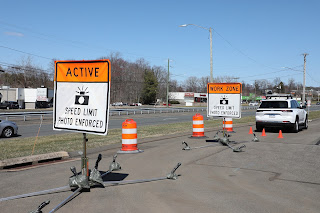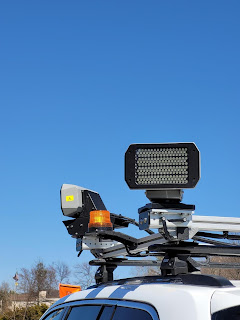Visit the headquarters of the Connecticut Department of Transportation in Newington and inside the front lobby you’ll see a strange memorial: orange safety cones draped in black. It’s a tribute to the nearly 40 men and women of the CDOT who’ve been killed in recent years doing their jobs maintaining our highways.
On any given day there may be
more than 1500 CDOT staffers and hundreds of other private contractors in
highway work zones. Some are fixing
guard rails or picking up litter. Others
could be engineers surveying the site for needed improvements.
The highway can’t be closed
down for them to do their work. It can
only be “coned” and warning signs posted.
Sometimes you’ll also see a “crash attenuator” truck with a sign on it
warning of construction ahead. Last year
those trucks were struck 24 times.
The real problem is speeding.
CDOT tells me that just last
month in Hartford more than 60% of vehicles were speeding through a work
zone. Last November a car was clocked in
Norwalk doing 90+ mph on I-95 while workers were doing their jobs.
Highway work crews receive
special training when out on an open highway.
In addition to using safety gear, they’re taught never to turn their
back on traffic. While most construction
is done from 9 am – 3 pm, many drivers wonder why it can’t be done at night
when traffic is lighter. Too many
complaints about noise, says CDOT. And
nights are when impaired drivers are out.
This week is National Work Zone Awareness Week, a
chance to remind us all that these CDOT employees put their lives in peril, not
by the necessary road repairs they do day and night, but by careless drivers.
Nationally some 857 workers were killed and another 44,240 were injured in work zone accidents in 2020 alone. Recently in Baltimore six road workers were killed in a single crash in broad daylight, even though they were on the other side of concrete Jersey barriers. More often the only thing separating workers from oncoming traffic is a few orange cones, hence the memorial at CDOT headquarters.
Last week CDOT instituted some
new technology that might keep its employees safer by discouraging reckless
drivers from speeding: automatic work zone speed cameras.
The cameras will record the license plate of any vehicle going too fast. If you’re 15 mph or more over the speed limit, the tech will automatically issue the owner up to a $150 speeding ticket by mail. CDOT even has a website to tell us where the cameras will be operating.
The work zone speed camera legislation is
the first type of “red light camera” allowed in the state. In Maryland where
the same tech was installed they saw an 80% reduction in speeding violations in
work zones.
But maybe, just maybe, these
new work zone speed cameras will deter dangerous drivers and allow CDOT
employees to fix the roads and go home to their families at the end of their
shift.





No comments:
Post a Comment